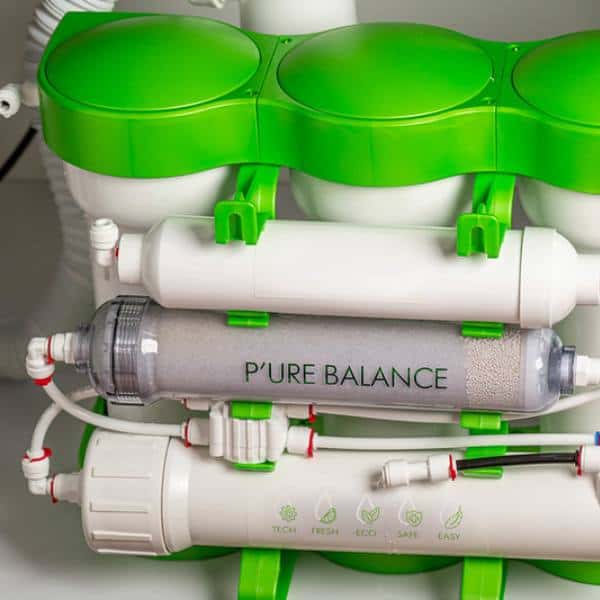What Is Reverse Osmosis Water?
Did you know that reverse osmosis is not just a water filtering process but rather an entire water purifying system? It’s a highly effective way of removing pollutants and debris from your drinking water supply.
A reverse osmosis system like APEC ROES-50 removes large molecules, such as salts and sugar, from water to make it safe for consumption. The process filters out contaminants using a unique membrane technology that blocks the passage of impurities while allowing pure H2O to pass through. Reverse osmosis can help reduce chlorine taste and odor levels in your home’s tap water, plus more hazardous substances such as lead and arsenic.
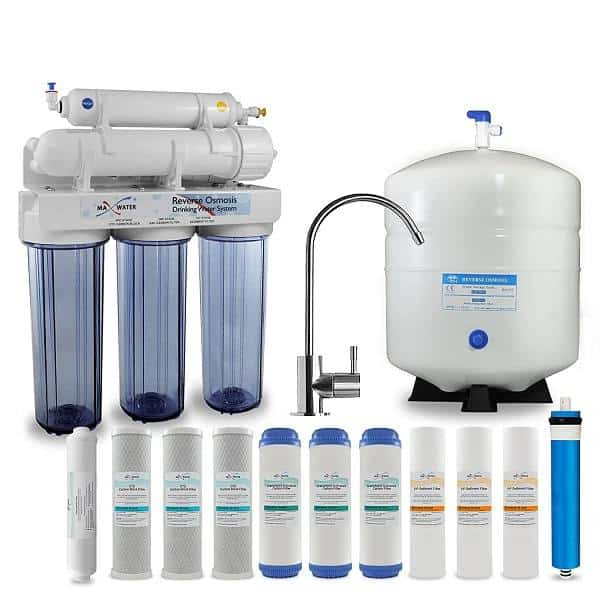
Additionally, it’s cost-effective since you don’t need chemicals or electricity to purify the water. All you need is access to a pre-filter, reverse osmosis membrane filter, and post-filter replacement every 6-12 months. So if you’re looking for cleaner, crisp-tasting drinking water at the turn of your taps – investing in reverse osmosis is the right choice!
Is Reverse Osmosis Water Bad For You?
Many people wonder if the reverse osmosis water so popular today is bad for us to consume. Reverse osmosis water can be very beneficial and refreshing to drink. This type of water goes through an extensive filtration system and removes any chemicals, bacteria, or other contaminants, making it much safer for consumption than regular tap water.
While it does have its benefits in terms of purity, it does have some drawbacks. Reverse osmosis water has been shown to contain fewer minerals than regular tap water and so can lack some essential nutrients we need.
Generally speaking, reverse osmosis does indeed remove certain beneficial minerals from your drinking water, such as calcium and magnesium. Still, for those that don’t need these minerals or already get them in their diet, it might be a viable solution since many people prefer the taste and purity of this type of purified water.
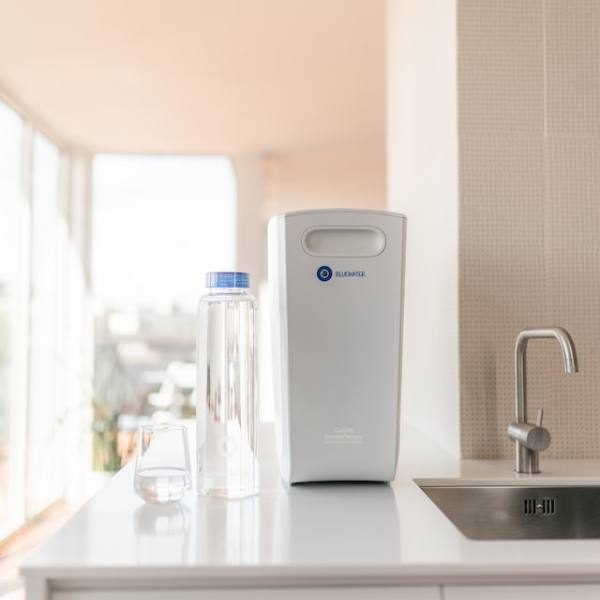
Furthermore, drinking reverse osmosis water may taste a bit ‘flat’ due to the lack of minerals compared with natural spring water. The good news is that pure reverse osmosis water can easily be ‘re-mineralized’ by adding trace elements such as calcium, magnesium, and sodium back into it – perfect for those who want all the purification without sacrificing flavor!
Does Reverse Osmosis System Take Out Healthy Minerals From Drinking Water?
Yes, the best whole house RO system does remove some of the minerals from drinking water. This is why it’s important to replace them with mineral supplements or add them back into your water through a process known as re-mineralization.
Although some healthy minerals can be taken out in the RO process, there are still many advantages to using this system. Reverse osmosis has been shown to reduce harmful chemicals and contaminants in drinking water, such as asbestos, lead, mercury, nitrates, and chlorine.
Re-Mineralizing Your Reverse Osmosis Water
For those who prefer the purity of reverse osmosis water but don’t want to sacrifice the minerals, re-mineralizing your RO system is an easy solution. You can buy mineral supplements or drops designed specifically for this purpose in most health food stores and online retailers, which can help you get back some essential minerals and nutrients.
Overall, reverse osmosis can be a great way to purify drinking water. It is highly effective in removing contaminants from your tap water and cost-effective too. However, it’s important to remember that RO water may lack essential minerals, so you should consider adding them back with mineral supplements or drops. Doing so will help ensure that you’re drinking safe, pure, and healthy water every day.
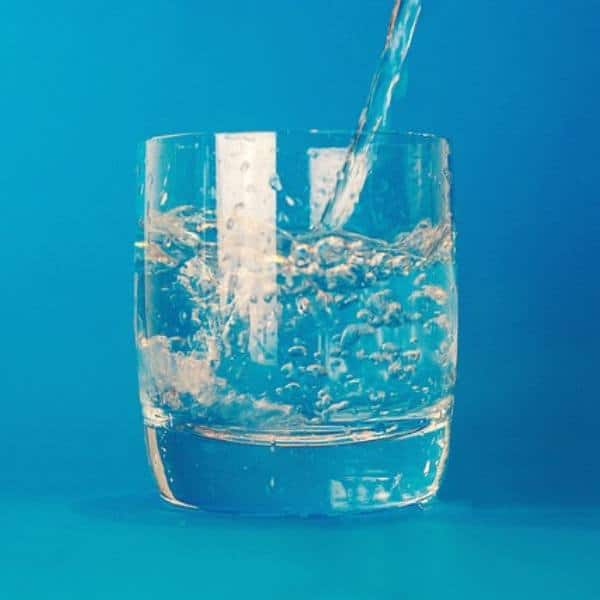
Is Reverse Osmosis Water Bad For Your Environment?
Reverse osmosis water is a popular choice for many individuals who are interested in having higher-quality drinking water so they can maintain a healthy lifestyle. But is this water source beneficial for the environment?
Reverse osmosis filters are great options for those who are looking for clean, pure drinking water, as it effectively filters out any contaminants and chemicals.
However, reverse osmosis does produce wastewater that is high in salinity, which can be harmful to the environment if it is not disposed of properly. Fortunately, there are several ways you can prevent this wastewater from entering the environment and affecting our ecosystems.
- You can look for RO systems that come with advanced filtration technologies that reduce salinity levels in the wastewater.
- Alternatively, you could invest in a system designed to produce less wastewater or a system with a built-in recycling feature that re-filters the wastewater and returns it into the drinking water.
Overall, reverse osmosis is an effective way to purify your drinking water and reduce environmental impact.
Benefits Of Reverse Osmosis Water
Reverse osmosis water has been gaining popularity over the last few years, and with good reason.
Convenient System
For one thing, it is incredibly convenient – install a filtration system in your home, and you have perfect drinking water at the touch of a button!
Protects Against Damaging Contaminants
Using this type of water filtration system helps to reduce impurities like dirt, sand, clay, sediment, and more from your water. This can help protect against damaging contaminants that could be harmful to your health and make sure that you always have clean, drinkable water.
Safer Than Tap or Bottled Water
Beyond the convenience factor, reverse osmosis water is also safer than tap or bottled water for two reasons:
- The filters remove hazardous particles such as lead and other toxins from your drinking water that are not caught through traditional filtering methods.
- Additionally, because no heating or boiling of the water is needed to make it drinkable, it also eliminates bacteria that can form during that process.
Excellent Choice For Health-Conscious Households
With a reverse osmosis system installed in your home, there is no need to worry about potential contaminants. This makes it an excellent choice for health-conscious households.
Better Taste
Additionally, reverse osmosis reduces levels of lead, arsenic, nitrates, and other metals in your tap water. As a result of fewer contaminants present in the water, after it has been through this process, it tastes better too!
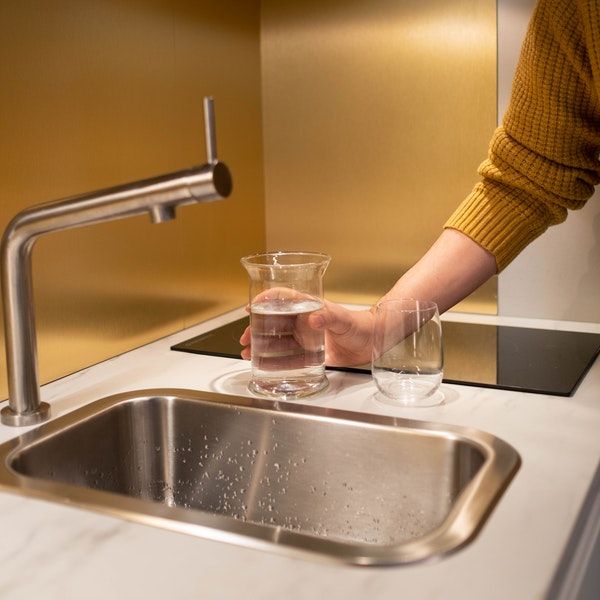
Downsides Of Reverse Osmosis Systems
Reverse Osmosis water is prevalent for its notorious purifying capabilities. However, with any technology, there can be drawbacks that many people overlook in this particular case.
Expensive
To start off, RO systems are not cheap by any means, and they tend to require a substantial amount of maintenance when compared to other filtration options such as Ultraviolet light or carbon filters.
In addition, these systems require energy to push water through the filtration system, and thus there is an ongoing expense that makes them impractical for some households.
It Filters Out Everything
Another con associated with this popular system is that although it does filter everything out – even minerals and vitamins essential for a healthy drinking experience – but those traces of minerals and vitamins are often necessary for proper bodily functioning.
Produce Wastewater
Lastly, reverse osmosis systems produce wastewater from every gallon of filtered drinking water they make and discard it into a drain or sewer system, which means that it is essentially wasted when compared to other methods like ultraviolet filtration and distillation–where all of the input meets up with the resultant output volume.
That is why you should look for reverse osmosis systems with advanced filtration technologies that reduce salinity levels in wastewater.
All in all, reverse osmosis systems offer numerous benefits, making them a great way to ensure access to clean and safe drinking water on demand. However, it is essential to consider pros and cons of reverse osmosis system before buying one.
Final Verdict
Overall, reverse osmosis water is not bad for you and can provide numerous benefits. This type of filtration system can reduce contaminants in your drinking water, making it safer and more palatable. Additionally, a RO system eliminates the need to buy bottled water or use tap water that may contain harmful particles.
However, there are some drawbacks to using a reverse osmosis system, such as the expense and maintenance associated with it, as well as the fact that it filters out minerals and vitamins. Ultimately, reverse osmosis systems can be a great way to ensure access to clean and safe drinking water on demand!
